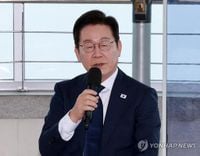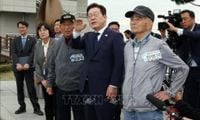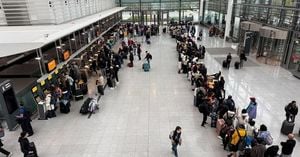On October 3, 2025, amid the gentle autumn light at the Ganghwa Peace Lookout in Incheon, South Korean President Lee Jae Myung stood before a gathering of elderly North Korean war refugees. His message, though simple in its humanity, echoed with the weight of decades: he called on North Korea to permit families separated by the Korean War (1950-1953) to confirm the fate of their relatives and to exchange letters. According to VOV.VN, this proposal marked the latest in a series of efforts by President Lee to thaw the long-frozen ties between the two Koreas.
President Lee’s appeal was not just a diplomatic gesture—it was deeply personal for many. As reported by TTXVN, he met with elderly North Korean defectors now living in South Korea, many of whom have not seen or even heard from their families since the guns fell silent in 1953. "Confirming whether separated family members are alive or deceased and facilitating letter exchanges is a political responsibility of both Koreas," Lee declared, his words underscoring the gravity of the situation faced by thousands of aging Koreans.
The humanitarian crisis of divided families remains one of the most poignant legacies of the Korean War. Over 70 years have passed since the armistice, but the wound is far from healed. The border remains sealed, with no direct channels for letters, phone calls, or any form of personal communication between ordinary citizens of North and South Korea. As the Bao An Giang noted, the president’s call was aimed squarely at addressing these humanitarian concerns, not just for the sake of diplomacy but for the countless families still waiting for news of loved ones.
Since taking office in June 2025, President Lee has made reconciliation a central pillar of his administration. It’s a notable shift after years of heightened tension under his predecessor, Yoon Suk Yeol. Lee’s approach, as detailed by VOV.VN, has included concrete steps: dismantling propaganda loudspeakers along the border, halting psychological warfare broadcasts, and even reducing the frequency of military drills, including those held jointly with the United States. These moves, he hopes, will signal to Pyongyang a genuine desire for peace.
Yet, the road to reconciliation is anything but smooth. As Lee acknowledged at the Ganghwa Peace Lookout, "There is no better hope than separated families being reunited and living together." But he was quick to temper that optimism, admitting, "Inter-Korean relations remain hostile, making this hope difficult to realize." The shadow of North Korea’s nuclear weapons program continues to loom large, stalling progress and leaving Lee’s overtures without a positive response from Pyongyang—at least so far.
Lee’s candor on the issue is striking. He openly admitted, as reported by VOV.VN, that the ongoing division and the suffering of separated families stem from political impasse, calling it a personal source of anguish. "This issue arises from the impotence of the political class, including myself," he said, laying bare the frustration and helplessness felt by many on both sides of the border.
For the families themselves, time is running out. According to TTXVN, approximately 36,000 South Korean citizens have formally requested reunions with family members in the North. Most are now in their seventies and eighties, their hope of reunion growing more urgent with each passing year. Since the historic inter-Korean summit in 2000, only 21 official reunions have been held, bringing together more than 20,000 separated family members. The last such event took place in August 2018. For many, the prospect of even a letter from a long-lost sibling or child would be a lifeline.
Historically, these reunions have often been timed to coincide with major holidays, such as Chuseok, the Korean harvest festival—a time when families across the peninsula gather to honor their ancestors and reconnect. During his recent speech, President Lee invoked this tradition, urging that, at the very least, the two governments allow families to exchange letters, if in-person meetings remain impossible. According to Bao An Giang, Lee stated that while the ideal would be for families to live together again, current realities demand more modest, but still meaningful, steps.
The political context cannot be ignored. The Korean War never officially ended; it was paused by an armistice, not a peace treaty. The border that slices the peninsula in two is one of the world’s most heavily fortified, and decades of mutual suspicion have left deep scars. President Lee’s recent moves to ease military tensions are significant, but as VOV.VN pointed out, fundamental disagreements—particularly over North Korea’s nuclear ambitions—continue to block real progress.
Despite these obstacles, Lee’s administration has not given up hope. The president has vowed to "do his utmost" to make family reunions a reality sooner rather than later. This commitment resonates with the elderly Koreans who, as TTXVN reported, long for nothing more than the chance to see or hear from their loved ones one last time. The urgency is palpable; every year, more members of this generation pass away, their stories of separation and longing left unresolved.
Observers say that even small gestures—like permitting the exchange of letters—could have a profound impact on inter-Korean relations. Such steps would not only address immediate humanitarian needs but could also serve as confidence-building measures, paving the way for broader dialogue on more contentious issues. As Lee emphasized, "The ideal scenario is for separated families to reunite and live together, but current inter-Korean relations make this difficult. Everything will be promoted in a more appropriate direction."
For now, the ball is in North Korea’s court. President Lee’s proposal, grounded in humanitarian concern and political responsibility, awaits a response from Pyongyang. As the world watches, the fate of thousands of aging Koreans hangs in the balance—a stark reminder that, even after seven decades, the legacy of the Korean War is far from over.
The hope for reunion persists, buoyed by the determination of those who refuse to let the past dictate the future. Whether through a letter, a phone call, or—one day—a long-awaited embrace, the yearning for connection endures, undiminished by the passage of time or the obstacles of politics.





